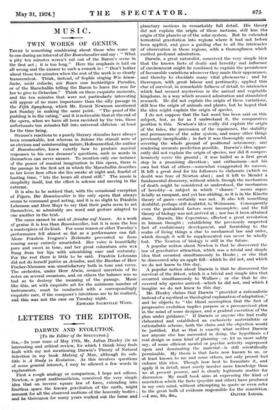LETTERS TO THE EDITOR.
DARWIN AND EVOLUTION.
[To the Editor of the SPECTATOR.] Sia,—In your issue of May 17th, Mr. Julian Huxley (in an interesting and critical review, for which I thank him) finds fault with my not mentioning. Darwin's Theory of Natural Selection in my book Making of Man, although its sub- title is A Study in Evolution. As this involves questions of some general interest, I may be allowed a few words in explanation.
First a rough analogy or comparison, I hope not odious. Newton,) a great mathematician, conceived the very simple ,idea that an inverse square law of force,, extending into limitless . space the known gravitation, of the earth, might account for all the observed motions a the heavenly bodies ; and he thereupon for many years worked 010 the lunar and
planetary motions in remarkably full detail. His theory did not explain the origin of those motions, still less the origin of the planets or of the solar system. But he extended terrestrial gravitation into regions where it had not before been applied, and gave a guiding clue to all the intricacies of observation in those regions, with a thoroughness which excited profound admiration.
Darwin, a great naturalist, conceived the very simple idea that the known facts of death and heredity and influence of environment might be combined to explain the persistence of favourable variations whenever they made their appearance, and thereby to elucidate many vital phenomena ; and he thereupon, with great labour and pertinacity, applied this clue of survival, in remarkable fullness of detail, to intricacies which had seemed mysterious in the animal and vegetable kingdoms, in a way which aroused admiration and stimulated research. He did not explain the origin of these variations, still less the origin of animals and plants, but he hoped that the idea might explain the origin of species.
I do not suppose that the last word has been said on this subject, but, as far as I understand it, the comparative position is this. Newton's idea really did explain the origin of the tides, the precession of the equinoxes, the stability and permanence of the solar system, and many other things previously inexplicable ; in fact it was thoroughly successful, covering the whole ground of positional astronomy, and rendering accurate prediction possible. Darwin's idea appar- ently did not explain the origin of species, nor did it compre- hensively cover the ground ; it was hailed as a first great step in a promising direction ; and enthusiasm—not his own but that of others—somewhat exaggerated its success. It left a great deal for his followers to elaborate (which no doubt was true of Newton also) ; and it left to Mendel a fundamental discovery, without which, though the mechanism of death might be considered ELS understood, the mechanism of heredity—a subject in which " chance " seems super- ficially as rampant, and yet law-abiding, as it is in the Kinetic theory of gases—certainly was not. It also left something doubtful, perhaps still doubtful, to Weismann. Consequently even the postulated factors were incomplete, and the full theory of biology was not arrived at ; nor has it been attained since. Darwin, like Copernicus, effected a great revolution in human thought ; establishing the previously suspected fact of evolutionary development, and furnishing to the realm of living things a clue to mechanical law and order, which though it will be supplemented can never be wholly lost. The Newton of biology is still in the future.
A popular notion about Newton is that he discovered the law of gravitative attraction, which was a trivial and simple idea that occurred simultaneously to Hooke ; or else that he discovered why an apple fell—which he did not, and which we do not know to this day.
A popular notion about Darwin is that he discovered the survival of the fittest, which is a trivial and simple idea that occurred simultaneously to Wallace ; or else that he dis- covered why species arrived—which he did not, and which I imagine we do not know to this day.
Mr. Huxley claims that Darwin "provided a rationalistic instead of a mystical or theological explanation of adaptation," and he objects to "the bland assumption that the fact of progressive evolution implies purpose or a preconceived plan in the mind of some designer, and a gradual execution of the plan under guidance." If Darwin or anyone else had really elaborated and established an exclusively materialistic or rationalistic scheme, both the claim and the objection would be justified. But as that is exactly what neither Darwin nor anyone else has succeeded in doing, the hypothesis o real design or some kind of planning—or, let us more safely say, of some efficient mental or psychic activity superposed upon and dominating the material—is still scientifically permissible. My thesis is that facts now known to us, or at least known to me and some others, not only permit but enforce this idea. Though how best to formulate it, and apply it in detail, must surely involve more knowledge than we at present possess, and is clearly legitimate matter for discussion. My small book aims at expressing the kind of conviction which the facts (psychic and other) have produced in my own mind, without attempting to quote or even refer to the great bulk a evidence responsible for the conviction,










































 Previous page
Previous page